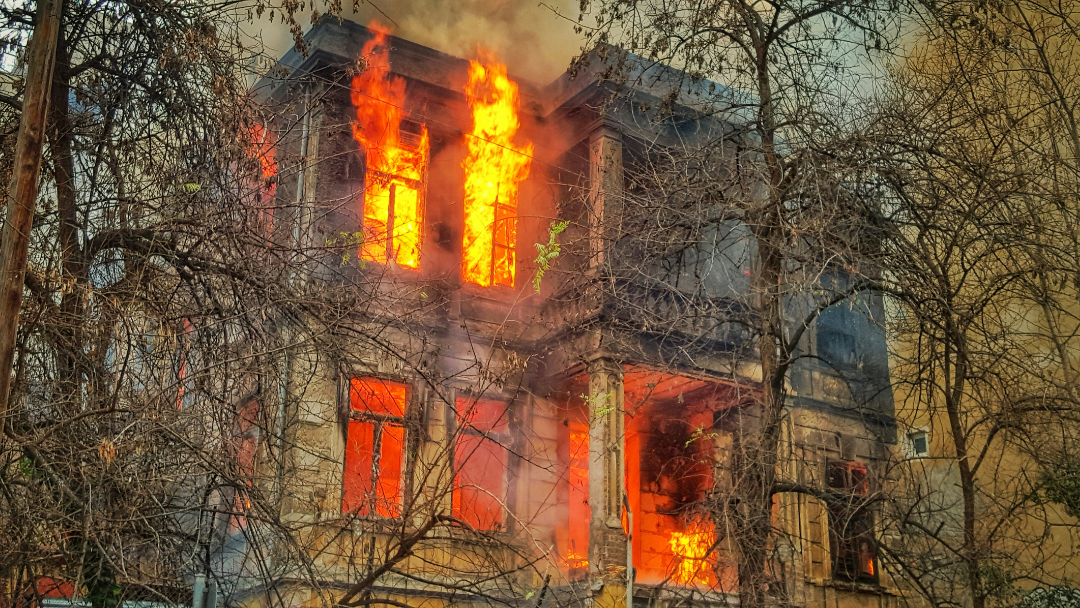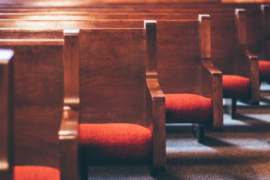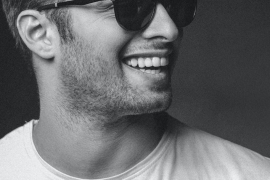Bailey Cunningham was Martin’s friend more than mine and it was early October when I first heard what happened to him. I’d been waiting for the school bus wearing my first pair of glasses and I was nervous of what the kids would say, so I’d clipped on a pair of dark flip-up shades. The bus doors folded open. As I shambled through the center aisle I kept my head down and grasped the tops of seats.
“I heard the windows exploded,” said Reed, smelling of drool and pretzels.
“Bet glass cut everyone up,” said Buck with his big headphones.
The bus slowed and I looked out the window. When I turned back, Buck was breathing at me, asking if I’d heard about Bailey Cunningham. When I shook my head no, he told me that over the weekend, Bailey’s house had burned. The kids echoed, answering with their own reports: that the smoke had been so thick it coated the development and choked the firemen to death; that his whole house exploded, and the ash covered all the roofs in the neighborhood; that an army of firemen had arrived and three didn’t make it out. We drove past the backyards of the homes on Bailey’s block, but didn’t stop as usual. The other kids must’ve noticed because they quieted.
“Bailey, is he ok?” I asked Buck.
“Yeah, my Dad said one fireman put out the whole thing himself by pissing on it.”
We drove toward Martin’s block, past the woods near his house, where we’d built the two tree forts. We’d run a rotten beam between them, and even though Martin was the only one who could’ve ever convinced me to cross the creek, in the end I’d said no.
Martin was leaning against the One Way sign waiting for our bus, but I couldn’t read anything from his face.
“Hey,” I said.
“Hey. Hell are you wearing sunglasses for? It’s nothing but clouds outside.”
“They’re clip-on. I had to get real ones so don’t tell anyone…Jesus. You hear about Bailey?”
“Yeah, it’s real bad. Mom heard their windows shatter. Woke my sister up it was so loud. We thought it was our windows.”
“Is he ok?”
“He’s alright. His Dad, he fell asleep smoking. That’s what caused it.” He paused and tried to eat his smile. “He’s still not quitting though.”
Martin lived close enough to Bailey to hear the walls cave. Bailey and his mom and dad were all ok, nobody hurt, except their cat, Inch. I did not ask what happened to Inch.
“Now they live in a town house,” Martin said.
“A brand new home, already?”
“No…a town house is a house connected to other, like, apartment houses. They’re in North Brookall. Where the poor people live.”
After the bus arrived at school, I floated through the rest of that day. I have no memory, even years later, now. Just an inability to concentrate, and a leaden wall of smoke is all I can see.
That afternoon, I met Martin.
“Do you want to go visit Bailey?” he said. “I’ve felt crappy about it all day.”
“I don’t know. Do you really think he wants to see us?”
“I would,” said Martin. “Maybe not you, but definitely me.”
Martin had his mom call mine to tell her I’d be staying for supper. Then we walked to the bus station which took us to town. A coke bottle on the bus rolled down the dirty aisle and knocked me in the heel. When we reached North Brookall, the doors opened on a long, low strip of brick buildings. We stepped on families of weeds growing from the concrete.
“He’s at 304,” said Martin, skirting around the apartments. Bailey’s building was near the back. We found a gray hallway and took echoey stairs leading to a door. Martin knocked.
His mother answered the door in a bulky gray sweater, greeting Martin, and introducing herself to me. She looked tired, like the way my sister would look years later when over Sunday lunch she’d tell us that Buck’s brother had knocked her up. Bailey’s mom led us into the kitchen where Bailey sat at the table, watching TV. He wore a black shirt that made him look pale, like he’d spent a week in some tunnel.
“Hey guys,” he said. He stood up and shook our hands, then led us down the hall to his room, which smelled like soy sauce. The room was empty except for some textbooks and a small bed which I could tell was too tiny for him.
“My parents…they’re both getting louder. I’m getting quiet. I’ve just been retreating into myself since it happened.” He sat up in bed. “Mom flipped yesterday when she found out I knew you could off yourself by sitting in a running car with the garage closed.” He smiled at the carpet. “Like we have a garage now.”
Bailey’s mom appeared in the door’s slight opening and asked if we’d like to stay for dinner. Martin said no. Bailey shook our hands again like we were scouts and we stepped out of his room. I thought that we should’ve brought Bailey something, a gift or some good food my mom would’ve made.
“Martin, that you?” we heard from down the hall. A man looked out from near the end of the hallway. Martin and I walked into another room to greet him and then he introduced me. The man relaxed in a lumpy red chair with a folded book on his knee. His foot hung down and brushed against the carpet. Behind the chair leg was an empty glass. He invited us to sit.
“You know, boys,” he said, “the thing I miss most from my house, besides Inch of course, are my books. Now I have to go back to that…damn library.” He looked out a narrow window as if the library would be there, looming. “I read that entire place already. All three floors. Sometimes I bet I’ve read the same book twice without even knowing.” He asked if we were staying for dinner and Martin said no. Then Bailey’s dad looked at me. “Those…sunglasses you’re wearing, boy?”
Martin and I walked under a dark sky back down the street to the bus station. “I don’t know how they stay so calm,” I said as we stepped off the bus by Martin’s. “I’d be screaming.”
“Maybe they do,” said Martin.
As we neared Bailey’s old house, he slowed and stopped. “You want to see it?”
What remained of Bailey’s house stood at the end of Pine Street and was partly hidden by deep brush and fallen clumps of treetops with cooked stumps. Ragged police tape hung on the walls and blew in the wind. “Careful,” I said. We stepped over rubble and stepped inside. The tile floor bubbled up in spots, warping in cracked black boils.
There was a gaping pit in the floor and I asked if this was where the couch had been. I followed Martin around to another side of the house that was once a kitchen – a gash in the wall allowed us to see through it. The dishwasher was caved in through the middle, beaten. Above it a wooden shelf slanted open, and inside were four giant teeth. I backed away but Martin edged closer, stepping over the wall and towards the white glow. He pulled the doorknob and it fell off its hinges. A cloud of ash rose and, once it cleared, we saw that the teeth were coffee mugs. There were three white and one clear. The tallest one read Happy Disney Vacation and was personalized to Bailey’s family in loopy lettering; there was a hairline crack sloping down the orange-yellow trunk of the palm tree. The other mug showed a white mountain inside a round snow globe. The third was of an ocean and a hermit crab, and the last, of glass, was too hazy to see. I stretched the bottom of my shirt and stood all four inside.
“Look how nice they are,” I said, once we’d left the ruins and spread all the mugs side by side in the grass. “Nice…when you look at the house.”
“We should do something with them,” he said. He poked another mug with his finger, leaving a dirt fingerprint. “I think his family’d like them.”
“I wouldn’t,” I said. “Don’t you think they’d feel insulted?”
“Why?”
“Well, maybe they wanted everything left behind.”
Martin took the Disney mug in his hand, cupping it low to his stomach, and spit on it. Then he wiped the spot clean with the bottom of his shirt. “I don’t know,” he said. “But I think, if I were left with nothing…I’d want something. And look, this one has his family on it, with Pluto. Pluto, man.”
We took two mugs each.
Back at my house, I talked about Bailey with my mom. The fire had been the talk of the office breakroom that day. “We’ll make his family a nice pot roast,” she said. But after dinner, I could hear her on the phone: “…You know, Sheila told me that Hank wanted his house to burn…that he set it himself by dousing all his books in whiskey.” I heard a long pause on the other line, “a little too poetic, don’t you think?”
That night in my room I cut the sleeves off one of my soccer t-shirts with my sister’s craft scissors. I spread the mugs in a row on my bed and threaded the cloth between the handles.
—
The night we went to return the mugs, we neared Bailey’s townhouse and the sky was deep red with groups of clouds. Martin walked up the steps in front of me. I was focused on his navy book bag. I’d wrapped my mugs in shirts and towels, and stood two steps below when he reached the door. It creaked open and a bright slat expanded across the steps.
“Oh…hello, boys,” said Bailey’s mother. “We were just finishing dinner…” she stood aside as if to welcome us in, but Martin put out his palm.
“Oh no, that’s ok Mrs. Cunningham,” and he turned around to get his bookbag. He unzipped it lopsided, the zipper buzzing low. “We just wanted to give you these.” He unwrapped the glass mug, which glimmered. He told her how we’d found them, while brushing the rim with his finger. A dizzy sickness rushed to my throat and I wondered what I’d say to Bailey’s mom if I had to throw up right there. She reached out and took Martin’s mug. “Boys, how…why were you in our house? I mean yes, thank you, we’re very grateful, but—”
Bailey’s father emerged at the end of the hallway and appeared to grow larger as he towered over to us. She tucked the mug into her shirt, and took the other three, still wrapped.
“Hello, boys,” he said, placing a hand on her shoulder. “We were just finishing dinner, but there’s pie, if you’d like.”
Bailey’s face peeked out from the kitchen.
Martin looked at Bailey’s dad and then at his mom, and then he ate his smile. “No, that’s alright. It’s getting late,” he said.
I bleated goodnight and we ran down the stairs, not stopping until the bus station to finally breathe.
“What was that about?” said Martin. “Were they grateful?”
“I think his Mom looked a little hurt,” I said.
“What do you mean?”
“In her face. Did you see? In her cheeks.”
“See his dad when he saw? I’ll bet he was grateful,” said Martin.
“Did he even see them?”
“He had to’ve seen mine. That thing sparkled.” He turned toward the bus station and we started walking. “Man, what a waste, huh?”
It’d be another month before Bailey returned to school. We still passed by his old block every morning, and once, just as the weather started turning, I journeyed back to the house alone. I stepped through the rubble, through the cracked tile and back around the police tape, now fraying. When I approached the fallen wall, the beaten-in dishwasher and the old angled shelf, I saw that someone had set back the mugs. Someone had turned them over and placed them on the dishwasher in a straight row. I took one in my hand and set it back. Then I turned them all over. I imagined a great rain that would come to fill the glasses. Water would rise and overflow. Water would spill on the counter. Collect in the dishwasher’s gash. I don’t know if his parents ever told Bailey about the mugs, but I guess it didn’t matter. Maybe Bailey would’ve said something to Martin if they had. In another month the men came and tore down what remained of the house.
PERRY GENOVESI lives in West Philadelphia, works as a public librarian, and serves his fellow workers in AFSCME District Council 47. He’s a ’24 Best Microfiction nominee, and his published fiction is forthcoming or has been featured in BULL, Eunoia, Streetcake, and collected on tiny.cc/PerryGenovesi. Sometimes he gets upset his phone fails to autocomplete every petname he has for his partner, and other times he gets mad his phone somehow knows he’s going to the beach. Twitter: @unionlibrarian
Like what you’re reading?Get new stories, sports musings, or book reviews sent to your inbox. Drop your email below to start >>>
NEW book release
Direct Connection by Laura Farmer. Order the book of stories of which Mike Meginnis says there is “an admirable simplicity at their heart: an absolute, unwavering confidence in the necessity of loving other people.”
GET THE BOOK



